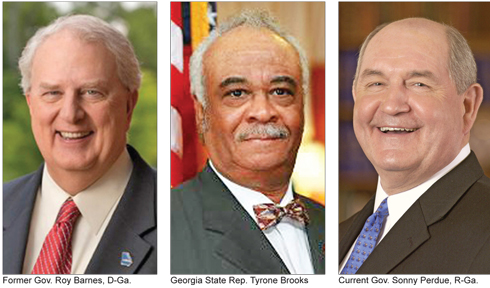Resegregation of southern politics hurts Black lawmakers
By Freddie Allen NNPA Washington Correspondent | Last updated: Feb 4, 2013 - 10:20:23 AMWhat's your opinion on this article?

|
“Virtually all Black elected officials in the region are outsiders looking in,” wrote senior research associate David Bositis in a study on re-segregation in southern politics. “The racially polarized voting that defines much of southern politics at this time, is in certain ways recreating the segregated system of the Old South, albeit a de facto system with minimal violence rather than the de jure system of before,” Mr. Bositis wrote.
Before the 1994 elections, 99.5 percent of Black state legislators were part of the controlling party in the South. Now, less than 5 percent of Black legislators serve in the majority in that region.
“When I came in everything was totally Democrat: the House, the Senate, the governor’s office, the judicial branch, everything,” said Georgia state Rep. Tyrone Brooks, who was first elected to the state House in 1980. “Now it’s just the opposite. It’s like day and night.”
When Democrats ruled the day, holding the governorship and serving in the majority in the state house and senate, Rep. Brooks said Georgia lawmakers were able to enact a number of progressive laws including an antiterrorism law in 1983 aimed at tracking the movements of the Ku Klux Klan and a 1987 law that reformed state welfare programs and created greater access to jobs.
In 2001, under Democratic Gov. Roy Barnes, the Georgia state legislature passed a bill Rep. Brooks sponsored to remove the Confederate battle emblem from the state flag.
Now Rep. Brooks can’t imagine any of those bills seeing the light of day in the Republican-controlled state.
Rep. Brooks watched Georgia state politics become “less progressive, more mean spirited, and more partisan” after Republican challenger Sonny Perdue defeated then-Gov. Roy Barnes in 2002. Gov. Perdue became the first Republican to run the state since the Reconstruction Era, breaking a winning streak for Democrats that spanned 130 years.
When Rep. Brooks fought for Blacks who worked in law enforcement, but were denied pensions before 1976, the Democrats were forced to compromise on a deal shutting out many of those who retired before the 2006 bill passed. Many of the officers that started patrols in segregated police precincts in the late 1940s passed away without seeing a dime.
Tennessee State Rep. Joe Armstrong noticed a shift in the balance of power during the 2000 presidential election. Former Vice President Al Gore, a Democrat, lost the election and Tennessee, his home state that year, despite his popularity as a member of United States House of Representatives (1977–85) and the United States Senate (1985–93).
Since then Rep. Armstrong witnessed White Democrats in his state switching parties to run for open seats and even disillusionment over the election of the nation’s first Black president.
Republicans in Tennessee command a supermajority, which doesn’t bode well for minorities and poor people living in the state.
“This (session) will really tell the story. The Republicans have an absolute majority,” said Rep. Armstrong. “They can call the General Assembly into session without a Democrat being represent.” He said they can also suspend the rules and bring a bill straight to the floor.
With Republicans wielding total control, Rep. Armstrong worries about funding that had been dedicated to economic development in the Black community. Resources that flowed to historically Black colleges and universities in the state have also come under increased scrutiny and during a turf war last April, Republicans threatened to cut funding for Meharry Medical College in Nashville and education groups.
“The Republicans have been throwing bombs now they have to defuse those bombs,” said Rep. Armstrong.
It’s been a rough ride for Rep. Barbara Ballard, too, who was elected to the Kansas state House of Representatives in 1992. But she is not discouraged.
“When you give up, nobody gets any information,” said Rep. Ballard. “You told people that you would represent them, You didn’t say: ‘I’m going to get elected and just sit there and not say a word, because I’m losing.’ You didn’t say: ‘I’m only going to vote, if I know I’m going to win.’ ”
Rep. Ballard explained, “If you let people intimidate you into thinking that you won’t make a difference and you say nothing, that’s when you lose.”

|
“They say, ‘We know you’re doing the best you can, we know you’re not in control, we know you don’t have the majority power and we know you’re fighting for us,’ ” Rep. Brooks said. “African-Americans appreciate that.”
Rep. Brooks and other Black southern Democrats have a lot of work to do to make sure that their appreciation doesn’t turn to apathy especially in states where Republicans control how voting districts are shaped.
According to a report last year published by the Brennan Center for Justice at New York University: “Many election contests are decided not on Election Day, but months and years before, when states redraw their districts. Both parties use redistricting to tilt the electoral terrain to achieve specific political objectives. This political gamesmanship brings with it important long-term electoral and policy consequences for voters.”
District lines are redrawn every 10 years based on information collected by the Census Bureau.
“Republican success during the most recent round of redistricting was partly the result of GOP control of state legislatures, which drew the lines in many states,” stated the report.
In 2010, Republicans picked up 12 state legislatures pushing the total number of states locked down by Republicans to 26.
“This was more than any time since 1952,” the report continued. “As a result, Republican state legislatures and governors controlled redistricting for about two-fifths of all Congressional districts—173 out of 435. By contrast, Democratic state legislatures and governors controlled redistricting for 44 districts.”
Rep. Brooks said that it’s critical for Black state legislators to adapt to the changing political landscape. But for Rep. Brooks, who is also the president of the Georgia Association of Black Elected Officials, convincing Democrats to adopt the same tactics that helped Republicans dominate state legislatures in the South is another uphill battle.
“I come from a different world than most of these elected officials,” he said. “When I say voter education, voter registration voter mobilization, they don’t get it.”
Rep. Brooks cut his teeth in community activism and civil rights working as a teenager with the Southern Christian Leadership Conference. He counts Ralph Abernathy, Joseph Lowery and Andrew Young as some of his closest mentors. To Rep. Brooks, the current power outage is just a part of the ongoing struggle for justice and equality.
“The (Democratic) Party must recognize the importance of investing in the voter education, voter registration, voter mobilization work and I’m talking about everyday work,” said the veteran lawmaker. “It can’t just be during a hot election season. It’s gotta be done every day. We gotta have people on the ground.”
Rep. Brooks is looking for President Obama to lead on this effort.
“President Obama and his team need to send a message, particularly in these red states,” said Rep. Brooks. “They have to make the investment early and work it every day. They have to have a budget set aside for that type of work, separate from campaigning.”
The signal has to come from the top down, Rep. Brooks said.
“If we don’t do that, it’s going to be an awful long time before Democrats are in control in these southern states,” Rep. Brooks said. “It may take a decade or even more.”
INSIDE STORIES AND REVIEWS
-
-
About Harriett ... and the Negro Hollywood Road Show
By Rabiah Muhammad, Guest Columnist » Full Story -
Skepticism greets Jay-Z, NFL talk of inspiring change
By Bryan 18X Crawford and Richard B. Muhammad The Final Call Newspaper @TheFinalCall » Full Story -
The painful problem of Black girls and suicide
By Charlene Muhammad -National Correspondent- » Full Story -
Exploitation of Innocence - Report: Perceptions, policies hurting Black girls
By Charlene Muhammad -National Correspondent- » Full Story -
Big Ballin: Big ideas fuel a father’s Big Baller Brand and brash business sense
By Bryan Crawford -Contributing Writer- » Full Story






 Click Here Stay Connected!
Click Here Stay Connected!








